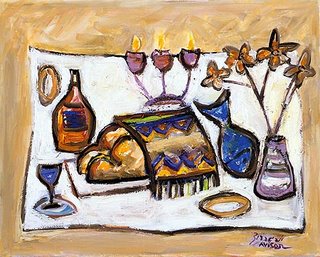Soon, the sun will set and the weekly day of rest will be upon us, the holy Sabbath. Now, I know a lot of Jews. Just look at our blog roll (and those are the people I don’t know in person). Having attended a seminary and a university that attracts a fair share of Jews, I am not shocked at the sheer number of Jews I know, but rather at their breadth of self-identification and the depth of their consideration. Whereas the reports I read through the course of the day decry young Jewish disaffection and unaffiliation, I know Jews across the spectrum of observance and identity. These Jews think deeply about the question of Jewish identity and have come up with a multitude of answers, but what distinguishes them from the literature that purports to address them is that, regardless of their answers, these young Jews are traditionally observant. Reform, Conservative, Orthodox, Reconstructionist, Non- and Post-denominational, these young people have chosen to bear the burden of reading, deciphering, and choosing halakha. I could attempt to express the why and the how of a Reform Jew choosing halakha, but RachelGM created a blog to address those very issues:
For many years, the motto of the Reform movement has been "Choice Through Knowledge" (lovingly shortened to CTK). In theory, this motto functions terrifically. Because (most/some) Reform Jews do not feel bound to halakha (Jewish law), and, the Movement does not believe halakha is binding (i.e., that Jews are bound to observe every Jewish law), we get this [theoretically] nifty idea of CTK. Functioning as it should, this would mean that Reform Jews study, study, study, learning about all of the "options" for practice available, all about halakha, and then make informed decisions about what they feel is applicable to their lives, meaningful to their expression and practice of Judaism, and relevant in a modern world.
Like I said, in theory, this would happen. But it does not. Rather, in many, if not most, situations/synagogues/individual lives CTK becomes perverted into Choice Through Ignorance. Due to the failing of our religious schools, the need to pander to the general laziness of many modern Reform Jews, and/or a desire to assimilate (amongst many other factors I will get into at a later date on this blog), we fail to properly educate Reform Jews, and Reform Jews fail to properly educate themselves. Accordingly, choices become “well, that’s too hard and takes too long” rather than “I do not keep Kosher because I do not feel that the original reasons that kashrut was demanded still exist and I find it more meaningful to be vegan, given harsh treatment of animals.” The latter is informed Choice Through Knowledge; the former emanates from lack of information and laziness.
She stresses that the purpose of her blog and of her collaboration with her peers is to promote an active engagement in the learning process through study and then apply that knowledge through practice. Her recent post on her discomfort, at times, in her own movement reflects a sentiment that I’ve heard across the board. In this time where we consciously choose affiliation (or not), we are often left with a feeling of discomfort when the other affiliates don’t act in the spirit of the movement.
My grandmother and I often discussed my religious affiliation, much to my frustrated chagrin. The seminary I attended was Conservative and while I attended I was relatively traditionally observant. She would throw out comments such as, “I don’t know if you can eat here [at a kosher restaurant that’s open on Saturday] because you’re Orthodox.” And I would reply, “Grandma, I’m traditionally observant, but not Orthodox. You can be traditionally observant and not be Orthodox. The students studying for ordination at the seminary are required by JTS to be shomer halakha.*” You can imagine that the arguments were circular and ended with me changing the topic. (NB: my grandma rocks and I in no way wish to disparage her here. In fact, I should call her right now.)
I’m off to call my Grandma and sulk in Annie’s absence. Have a good Friday night- Saturday, whatever that means to you.
*shomer halakha: shomer means “observe” in Hebrew, so ostensibly someone who is “shomer halakha” observes Jewish law. The content of that halakha and who should be ascribed that label are up for debate.

5 comments:
I started a program at my reform shul for 20/30 somethings called Itza Mitzvah. It is a monthly discussion group about different mitzvot. We started with Shabbat, then moved on to Kashrut. This month we are doing the December Dilemma. Not a mitzvah, but shalom bayit is and juggling winter traditions can definitely affect peace in the home.
Thanks for the shout out.
I've decided I'm really Chassidic, though. Thus my inclination to start wishing people "Shabbat Shalom" on about Tuesday, in the hopes that, perhaps, it will come a little sooner.
I kid, I kid.
Yay Reform! I'll say something more intelligent later. Perhaps I'll even answer one of the 9000 questions people have left on my blog.
What's the deal with everyone wanting to label each other and draw lines around observance levels? I think we should start a new classification: I'm a Conscious, Thinking Jew (CTJ for short).
Curly - I don't wish to label anyone else; just myself. Also, for those of us who like labels, it's just as frustrating when people say we're not entitled to our labels as when those who don't like to be labeled are labeled. Just a thought. Party on with your Conscious, Thinking Self, but please join me in my acceptance of pluralism as a labeled OR unlabeled path into Judaism. Judaism will be stronger, if we do so, in future, I do believe.
Post a Comment